Edie Melson's Blog, page 386
February 14, 2015
Who Makes Your Soul Blossom?
Since today is Valentine's Day, I'd love to know who makes your soul blossom.
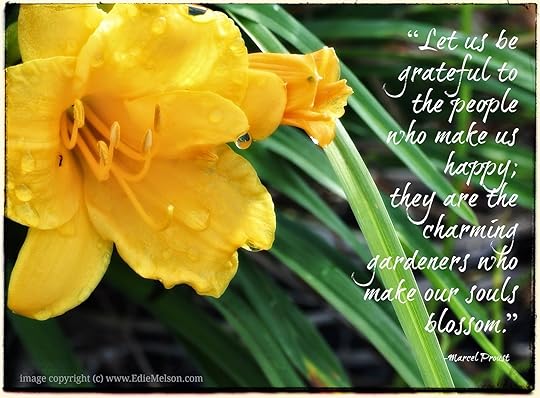 "Let us be grateful to the people who make us happy;
"Let us be grateful to the people who make us happy;
they are the charming gardeners who make our souls blossom."
~Marcel Proust
Share your thoughts in the comment section below.
I also invite you to use this image any way you like online. Post it to your blog, share it on Facebook, Twitter, Pinterest, anywhere you'd like. All I ask is that you keep it intact, with my website watermark visible.
Don't forget to join the conversation!Blessings,
Edie
 "Let us be grateful to the people who make us happy;
"Let us be grateful to the people who make us happy; they are the charming gardeners who make our souls blossom."
~Marcel Proust
Share your thoughts in the comment section below.
I also invite you to use this image any way you like online. Post it to your blog, share it on Facebook, Twitter, Pinterest, anywhere you'd like. All I ask is that you keep it intact, with my website watermark visible.
Don't forget to join the conversation!Blessings,
Edie
Published on February 14, 2015 01:00
February 13, 2015
10 Superstitions Debunked for Writers
by Vonda Skelton @VondaSkelton
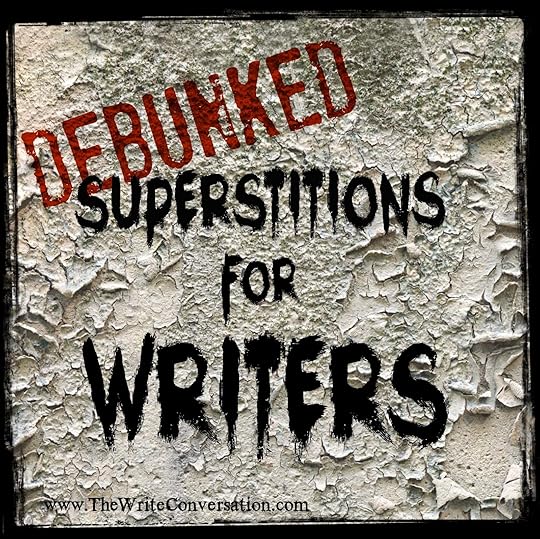 Today is Friday the 13th, a perfect day to look at 10 superstitions from a writer’s point of view.
Today is Friday the 13th, a perfect day to look at 10 superstitions from a writer’s point of view.
1. Superstition: A black cat crossing your path will bring bad luck.Writer’s Truth: Any frivolous thing you allow to distract you from your writing path will bring bad results.
2. Superstition: It’s bad luck to walk under a ladder.Writer’s Truth: You can’t climb the ladder of success by walking underneath it. You have to get on the ladder and do the work to move up.
3. Superstition: It’s bad luck to open an umbrella inside the house.Writer’s Truth: Getting out from under the umbrella of mentors, encouragers, and writers’ groups will put you at risk.
 4. Superstition: Four leaf clovers bring good luck.Writer’s Truth: Four basic elements of writing—writing, rewriting, editing, and submitting—will bring results you want.
4. Superstition: Four leaf clovers bring good luck.Writer’s Truth: Four basic elements of writing—writing, rewriting, editing, and submitting—will bring results you want.
5. Superstition: Leaving a house out a different door than the one you entered will bring bad luck.Writer’s Truth: Trying new doors when others close will assure more opportunities for success.
6. Superstition: Horseshoes bring good luck. Writer’s Truth: Hard work brings “good luck.”
 7. Superstition: Breaking a mirror brings 7 years of bad luck.Writer’s Truth: Refusing to face the truth about your writing deficiencies will doom your writing career.
7. Superstition: Breaking a mirror brings 7 years of bad luck.Writer’s Truth: Refusing to face the truth about your writing deficiencies will doom your writing career.
8. Superstition: A rabbit’s foot brings good luck.Writer’s Truth: Continuing to walk down the writing path when things don’t go your way will bring “good luck.”
9. Superstition: A watermelon will grow in your stomach if you swallow a watermelon seed.Writer’s Truth: Allowing regret or pride to grow will sabotage your writing career.
10. Superstition: Throw coins into a wishing well while making a wish and your dream will come true.Writer’s Truth: When it comes to your writing dream, you might as well throw your money into the ocean. Perseverance is what makes the dream come true.
So there you have it, 10 superstitions debunked for writers. What superstitions and writer’s truths can you add to the list?
Don’t forget to join the conversation!
TWEETABLESOn Friday the 13th, 10 Superstitions debunked for writers - via @VondaSkelton on @EdieMelson (Click to Tweet)
Common superstitions that apply to writers as well - via @VondaSkelton on @EdieMelson (Click to Tweet)
 Vonda Skelton is a speaker and the author of four books: Seeing Through the Lies: Unmasking the Myths Women Believe and the 3-book Bitsy Burroughs mysteries for children 8-12 yo. She’s the founder and co-director of Christian Communicators Conference, offering speakers’ training and community for Christian women called to ministry. Vonda is a frequent instructor at writer’s conferences and keynotes at business, women’s, and associational events. You can find out more about Vonda, as well as writing opportunities and instruction at her writer’s blog, The Christian Writer’s Den at VondaSkelton.com.
Vonda Skelton is a speaker and the author of four books: Seeing Through the Lies: Unmasking the Myths Women Believe and the 3-book Bitsy Burroughs mysteries for children 8-12 yo. She’s the founder and co-director of Christian Communicators Conference, offering speakers’ training and community for Christian women called to ministry. Vonda is a frequent instructor at writer’s conferences and keynotes at business, women’s, and associational events. You can find out more about Vonda, as well as writing opportunities and instruction at her writer’s blog, The Christian Writer’s Den at VondaSkelton.com.
 Today is Friday the 13th, a perfect day to look at 10 superstitions from a writer’s point of view.
Today is Friday the 13th, a perfect day to look at 10 superstitions from a writer’s point of view. 1. Superstition: A black cat crossing your path will bring bad luck.Writer’s Truth: Any frivolous thing you allow to distract you from your writing path will bring bad results.
2. Superstition: It’s bad luck to walk under a ladder.Writer’s Truth: You can’t climb the ladder of success by walking underneath it. You have to get on the ladder and do the work to move up.
3. Superstition: It’s bad luck to open an umbrella inside the house.Writer’s Truth: Getting out from under the umbrella of mentors, encouragers, and writers’ groups will put you at risk.
 4. Superstition: Four leaf clovers bring good luck.Writer’s Truth: Four basic elements of writing—writing, rewriting, editing, and submitting—will bring results you want.
4. Superstition: Four leaf clovers bring good luck.Writer’s Truth: Four basic elements of writing—writing, rewriting, editing, and submitting—will bring results you want.5. Superstition: Leaving a house out a different door than the one you entered will bring bad luck.Writer’s Truth: Trying new doors when others close will assure more opportunities for success.
6. Superstition: Horseshoes bring good luck. Writer’s Truth: Hard work brings “good luck.”
 7. Superstition: Breaking a mirror brings 7 years of bad luck.Writer’s Truth: Refusing to face the truth about your writing deficiencies will doom your writing career.
7. Superstition: Breaking a mirror brings 7 years of bad luck.Writer’s Truth: Refusing to face the truth about your writing deficiencies will doom your writing career. 8. Superstition: A rabbit’s foot brings good luck.Writer’s Truth: Continuing to walk down the writing path when things don’t go your way will bring “good luck.”
9. Superstition: A watermelon will grow in your stomach if you swallow a watermelon seed.Writer’s Truth: Allowing regret or pride to grow will sabotage your writing career.
10. Superstition: Throw coins into a wishing well while making a wish and your dream will come true.Writer’s Truth: When it comes to your writing dream, you might as well throw your money into the ocean. Perseverance is what makes the dream come true.
So there you have it, 10 superstitions debunked for writers. What superstitions and writer’s truths can you add to the list?
Don’t forget to join the conversation!
TWEETABLESOn Friday the 13th, 10 Superstitions debunked for writers - via @VondaSkelton on @EdieMelson (Click to Tweet)
Common superstitions that apply to writers as well - via @VondaSkelton on @EdieMelson (Click to Tweet)
 Vonda Skelton is a speaker and the author of four books: Seeing Through the Lies: Unmasking the Myths Women Believe and the 3-book Bitsy Burroughs mysteries for children 8-12 yo. She’s the founder and co-director of Christian Communicators Conference, offering speakers’ training and community for Christian women called to ministry. Vonda is a frequent instructor at writer’s conferences and keynotes at business, women’s, and associational events. You can find out more about Vonda, as well as writing opportunities and instruction at her writer’s blog, The Christian Writer’s Den at VondaSkelton.com.
Vonda Skelton is a speaker and the author of four books: Seeing Through the Lies: Unmasking the Myths Women Believe and the 3-book Bitsy Burroughs mysteries for children 8-12 yo. She’s the founder and co-director of Christian Communicators Conference, offering speakers’ training and community for Christian women called to ministry. Vonda is a frequent instructor at writer’s conferences and keynotes at business, women’s, and associational events. You can find out more about Vonda, as well as writing opportunities and instruction at her writer’s blog, The Christian Writer’s Den at VondaSkelton.com.
Published on February 13, 2015 01:00
February 12, 2015
Pen or Computer: Which is Better for a Writer’s Creativity?
by Warren Adler @WarrenAdler
 "Writers fear a dam that changes the course of the
"Writers fear a dam that changes the course of the
river of creativity." —Warren AdlerFor writers of the imagination, what we fear the most is a disruption, a blockage, a sudden dam that changes the course of the river of creativity. Back in the late sixties and early seventies when technological innovation began to creep into the public consciousness, I shunned all the so-called marvels of computers when it came to my writing process. As a novelist, I feared that switching to these new fangled machines might somehow inhibit my ever-reliable muse, but what I feared most was a disruption of my creative process, a drastic change to my internal thinking patterns that would inhibit my imagination. A strange new means of composition at the time, the computer seemed an intrusion or, at best, an unwelcome detour on a well-traveled road to storytelling.
The Old Days
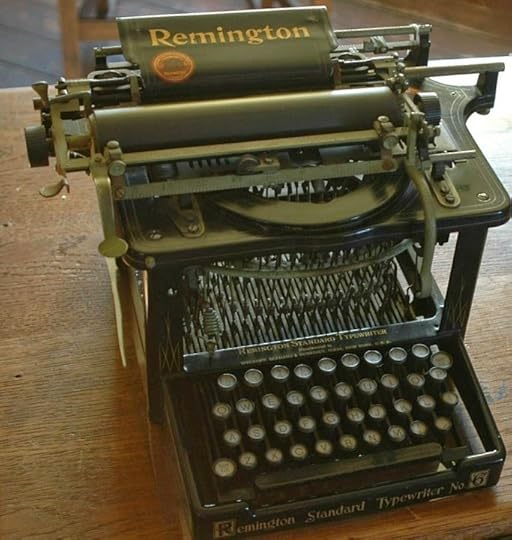 Up to that point, I had been composing in pen and ink before making the transition to a manual typewriter. I had learned to type at the age of seventeen on a clunky old Remington and had become quickly used to the feel of the keys on my fingers. I discovered how great it was to see my words in black type, almost as if it were already a page in a book. I have to admit, that as I continue to work on a keyboard today, I’ve found that it creates the same comforting sound that once accompanied me during my creative revels on that old clunky Remington.
Up to that point, I had been composing in pen and ink before making the transition to a manual typewriter. I had learned to type at the age of seventeen on a clunky old Remington and had become quickly used to the feel of the keys on my fingers. I discovered how great it was to see my words in black type, almost as if it were already a page in a book. I have to admit, that as I continue to work on a keyboard today, I’ve found that it creates the same comforting sound that once accompanied me during my creative revels on that old clunky Remington.
I grew used to rushing through a first draft, reworking it with pen in hand, retyping, reworking, retyping until I had my manuscript in what I had internally believed was reasonably acceptable for submission to my then agent. I used the services of a few freelance typists who had grown used to my hasty yet elaborate chicken marks. I had long ago discovered that the secret to good writing was rewriting. I rewrite like mad, changing dialogue, characters, plot points, reconsidering different ways of expressing the material; the subconscious is a very busy place, and every nuance, every thought, is constantly changing. Writing stories is like building a house with wooden blocks: remove one, and you must rearrange the supporting neighbors or the whole structure will collapse
Making the Transition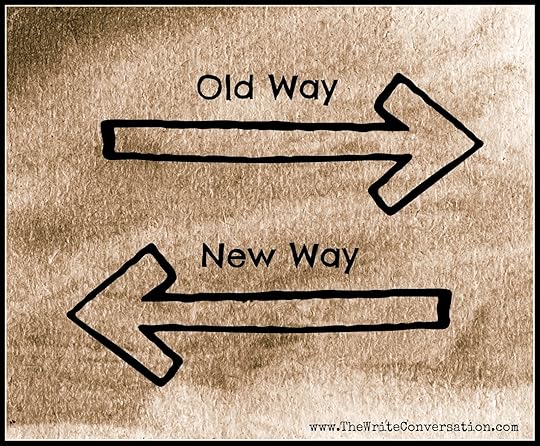 Because I spent a vast amount of time composing my novels in my basement writing room, I owned three Smith Corona portable typewriters. One was my primary work tool until its mechanism shouted for repairs, one was in reserve, and one was always in the shop. My fingers were invariably stained by carbon from used-up ribbons that constantly needed changing.
Because I spent a vast amount of time composing my novels in my basement writing room, I owned three Smith Corona portable typewriters. One was my primary work tool until its mechanism shouted for repairs, one was in reserve, and one was always in the shop. My fingers were invariably stained by carbon from used-up ribbons that constantly needed changing.
I was still in the advertising business in those days. I would get to my basement writing desk before six in the morning and write for about four hours before hustling off to my office for my regular workday; the pittance I earned from writing was hardly enough to support a growing family.
It was during my time in the advertising business that computers were proliferating. I now had the option to eliminate my freelance typists since I could compose and make changes directly on the screen, but if you were unable to break the habit of making changes on paper, printers were available.
One of my writing friends, a world famous photographer/writer, Fred Ward, was an advanced techie, and assured me that a computer was an enhancement rather than a hindrance, and finally, after much persuasion, I bought my first clunky computer in the early 1980’s. The writing program was called Wordstar and I attached a Hewlett Packard laser printer that could print out a few pages a minute, which I thought, at the time, was remarkable. Of course I kept my three Smith Coronas at the ready in case this technology failed me, and so I chugged away learning Wordstar.
Getting Over the FearSome of my writing friends continued to resist, and they often insisted that they were happy with the old ways of pen on paper or mechanical typewriter. In fact, many of them continued to compose that way and some still do; I have a number of writing friends that have refused to adapt under any circumstances. I suppose it is an age thing. After all, they argue, the greatest works of literature were composed with pen and paper. Were William Shakespeare or Charles Dickens inhibited by the lack of computer technology?
I must admit that it took a while to get over my fear. When I slowed down or met an obstacle while writing, I wondered whether or not the disruption was due to the new process and the difficulties of having to remember the new strokes on a computer keyboard. Thankfully, my earlier typing skills came in handy and after a few months I was able to write and rewrite to my heart’s content, which I continue to do today.
I suppose my story has been experienced by many writers across the globe who were plagued by similar fears. To a younger generation, many of whom are no longer taught the elements of penmanship, my experience could be laughable.
How do You Prefer to Write? I am totally committed today to writing on my computer. It offers a writer a vast improvement especially in time saving and research. The creative process remains the same as it always was, requiring deep thought, constant improvement and extensive re-writing. But most of all, in terms of speed and convenience, it is an enormous help. Still, despite such improvements, if suddenly the electrical grid was destroyed and a complete power blackout would occur I would still continue my writing schedules. It is a necessary component of my life.
I am totally committed today to writing on my computer. It offers a writer a vast improvement especially in time saving and research. The creative process remains the same as it always was, requiring deep thought, constant improvement and extensive re-writing. But most of all, in terms of speed and convenience, it is an enormous help. Still, despite such improvements, if suddenly the electrical grid was destroyed and a complete power blackout would occur I would still continue my writing schedules. It is a necessary component of my life.
An old friend, John David Garcia, now deceased, once declared that the goal of life is to evolve into pure mind. He wrote a book calledThe Moral Society, and claimed that technology might one day bring us to pure mind. But a truly inspired and gifted writer, as has been proven over the centuries, does not need the geegaws of modern technology to create masterworks of great insight and benefit to the human species.
While it has made a vast difference in discoverability and marketing, giving opportunity to emerging writers to get into the publishing fray, I doubt if it has made one iota of difference in the quality of the offerings.
On that note, I want to know, how do you prefer to compose?
TWEETABLES
Pen or Computer: Which is Better for a Writer's #Creativity - Thoughts from novelist @WarrenAdler (Click to Tweet)
Can technology enhance or disrupt our creativity as writers? Thoughts from novelist @WarrenAdler (Click to Tweet)
 Warren Adler is best known for The War of the Roses, his masterpiece fictionalization of a macabre divorce turned into the Golden Globe and BAFTA nominated dark comedy hit starring Michael Douglas, Kathleen Turner and Danny DeVito. Adler's international hit stage adaptation of the novel will premiere on Broadway in 2015-2016. Adler has also optioned and sold film rights for a number of his works including Random Hearts (starring Harrison Ford and Kristen Scott Thomas) and The Sunset Gang (produced by Linda Lavin for PBS' American Playhouse series starring Jerry Stiller, Uta Hagen, Harold Gould and Doris Roberts). In recent development are the Broadway Production of The War of the Roses, to be produced by Jay and Cindy Gutterman, The War of the Roses - The Children (Grey Eagle Films and Permut Presentations), a feature film adaptation of the sequel to Adler's iconic divorce story, Target Churchill (Grey Eagle Films and Solution Entertainment),Mourning Glory, to be adapted by Karen Leigh Hopkins, and Capitol Crimes (Grey Eagle Films and Sennet Entertainment), a television series based on his Fiona Fitzgerald mystery series. Warren Adler's newest thriller, Treadmill, is officially available.
Warren Adler is best known for The War of the Roses, his masterpiece fictionalization of a macabre divorce turned into the Golden Globe and BAFTA nominated dark comedy hit starring Michael Douglas, Kathleen Turner and Danny DeVito. Adler's international hit stage adaptation of the novel will premiere on Broadway in 2015-2016. Adler has also optioned and sold film rights for a number of his works including Random Hearts (starring Harrison Ford and Kristen Scott Thomas) and The Sunset Gang (produced by Linda Lavin for PBS' American Playhouse series starring Jerry Stiller, Uta Hagen, Harold Gould and Doris Roberts). In recent development are the Broadway Production of The War of the Roses, to be produced by Jay and Cindy Gutterman, The War of the Roses - The Children (Grey Eagle Films and Permut Presentations), a feature film adaptation of the sequel to Adler's iconic divorce story, Target Churchill (Grey Eagle Films and Solution Entertainment),Mourning Glory, to be adapted by Karen Leigh Hopkins, and Capitol Crimes (Grey Eagle Films and Sennet Entertainment), a television series based on his Fiona Fitzgerald mystery series. Warren Adler's newest thriller, Treadmill, is officially available.
 "Writers fear a dam that changes the course of the
"Writers fear a dam that changes the course of theriver of creativity." —Warren AdlerFor writers of the imagination, what we fear the most is a disruption, a blockage, a sudden dam that changes the course of the river of creativity. Back in the late sixties and early seventies when technological innovation began to creep into the public consciousness, I shunned all the so-called marvels of computers when it came to my writing process. As a novelist, I feared that switching to these new fangled machines might somehow inhibit my ever-reliable muse, but what I feared most was a disruption of my creative process, a drastic change to my internal thinking patterns that would inhibit my imagination. A strange new means of composition at the time, the computer seemed an intrusion or, at best, an unwelcome detour on a well-traveled road to storytelling.
The Old Days
 Up to that point, I had been composing in pen and ink before making the transition to a manual typewriter. I had learned to type at the age of seventeen on a clunky old Remington and had become quickly used to the feel of the keys on my fingers. I discovered how great it was to see my words in black type, almost as if it were already a page in a book. I have to admit, that as I continue to work on a keyboard today, I’ve found that it creates the same comforting sound that once accompanied me during my creative revels on that old clunky Remington.
Up to that point, I had been composing in pen and ink before making the transition to a manual typewriter. I had learned to type at the age of seventeen on a clunky old Remington and had become quickly used to the feel of the keys on my fingers. I discovered how great it was to see my words in black type, almost as if it were already a page in a book. I have to admit, that as I continue to work on a keyboard today, I’ve found that it creates the same comforting sound that once accompanied me during my creative revels on that old clunky Remington.I grew used to rushing through a first draft, reworking it with pen in hand, retyping, reworking, retyping until I had my manuscript in what I had internally believed was reasonably acceptable for submission to my then agent. I used the services of a few freelance typists who had grown used to my hasty yet elaborate chicken marks. I had long ago discovered that the secret to good writing was rewriting. I rewrite like mad, changing dialogue, characters, plot points, reconsidering different ways of expressing the material; the subconscious is a very busy place, and every nuance, every thought, is constantly changing. Writing stories is like building a house with wooden blocks: remove one, and you must rearrange the supporting neighbors or the whole structure will collapse
Making the Transition
 Because I spent a vast amount of time composing my novels in my basement writing room, I owned three Smith Corona portable typewriters. One was my primary work tool until its mechanism shouted for repairs, one was in reserve, and one was always in the shop. My fingers were invariably stained by carbon from used-up ribbons that constantly needed changing.
Because I spent a vast amount of time composing my novels in my basement writing room, I owned three Smith Corona portable typewriters. One was my primary work tool until its mechanism shouted for repairs, one was in reserve, and one was always in the shop. My fingers were invariably stained by carbon from used-up ribbons that constantly needed changing.I was still in the advertising business in those days. I would get to my basement writing desk before six in the morning and write for about four hours before hustling off to my office for my regular workday; the pittance I earned from writing was hardly enough to support a growing family.
It was during my time in the advertising business that computers were proliferating. I now had the option to eliminate my freelance typists since I could compose and make changes directly on the screen, but if you were unable to break the habit of making changes on paper, printers were available.
One of my writing friends, a world famous photographer/writer, Fred Ward, was an advanced techie, and assured me that a computer was an enhancement rather than a hindrance, and finally, after much persuasion, I bought my first clunky computer in the early 1980’s. The writing program was called Wordstar and I attached a Hewlett Packard laser printer that could print out a few pages a minute, which I thought, at the time, was remarkable. Of course I kept my three Smith Coronas at the ready in case this technology failed me, and so I chugged away learning Wordstar.
Getting Over the FearSome of my writing friends continued to resist, and they often insisted that they were happy with the old ways of pen on paper or mechanical typewriter. In fact, many of them continued to compose that way and some still do; I have a number of writing friends that have refused to adapt under any circumstances. I suppose it is an age thing. After all, they argue, the greatest works of literature were composed with pen and paper. Were William Shakespeare or Charles Dickens inhibited by the lack of computer technology?
I must admit that it took a while to get over my fear. When I slowed down or met an obstacle while writing, I wondered whether or not the disruption was due to the new process and the difficulties of having to remember the new strokes on a computer keyboard. Thankfully, my earlier typing skills came in handy and after a few months I was able to write and rewrite to my heart’s content, which I continue to do today.
I suppose my story has been experienced by many writers across the globe who were plagued by similar fears. To a younger generation, many of whom are no longer taught the elements of penmanship, my experience could be laughable.
How do You Prefer to Write?
 I am totally committed today to writing on my computer. It offers a writer a vast improvement especially in time saving and research. The creative process remains the same as it always was, requiring deep thought, constant improvement and extensive re-writing. But most of all, in terms of speed and convenience, it is an enormous help. Still, despite such improvements, if suddenly the electrical grid was destroyed and a complete power blackout would occur I would still continue my writing schedules. It is a necessary component of my life.
I am totally committed today to writing on my computer. It offers a writer a vast improvement especially in time saving and research. The creative process remains the same as it always was, requiring deep thought, constant improvement and extensive re-writing. But most of all, in terms of speed and convenience, it is an enormous help. Still, despite such improvements, if suddenly the electrical grid was destroyed and a complete power blackout would occur I would still continue my writing schedules. It is a necessary component of my life.An old friend, John David Garcia, now deceased, once declared that the goal of life is to evolve into pure mind. He wrote a book calledThe Moral Society, and claimed that technology might one day bring us to pure mind. But a truly inspired and gifted writer, as has been proven over the centuries, does not need the geegaws of modern technology to create masterworks of great insight and benefit to the human species.
While it has made a vast difference in discoverability and marketing, giving opportunity to emerging writers to get into the publishing fray, I doubt if it has made one iota of difference in the quality of the offerings.
On that note, I want to know, how do you prefer to compose?
TWEETABLES
Pen or Computer: Which is Better for a Writer's #Creativity - Thoughts from novelist @WarrenAdler (Click to Tweet)
Can technology enhance or disrupt our creativity as writers? Thoughts from novelist @WarrenAdler (Click to Tweet)
 Warren Adler is best known for The War of the Roses, his masterpiece fictionalization of a macabre divorce turned into the Golden Globe and BAFTA nominated dark comedy hit starring Michael Douglas, Kathleen Turner and Danny DeVito. Adler's international hit stage adaptation of the novel will premiere on Broadway in 2015-2016. Adler has also optioned and sold film rights for a number of his works including Random Hearts (starring Harrison Ford and Kristen Scott Thomas) and The Sunset Gang (produced by Linda Lavin for PBS' American Playhouse series starring Jerry Stiller, Uta Hagen, Harold Gould and Doris Roberts). In recent development are the Broadway Production of The War of the Roses, to be produced by Jay and Cindy Gutterman, The War of the Roses - The Children (Grey Eagle Films and Permut Presentations), a feature film adaptation of the sequel to Adler's iconic divorce story, Target Churchill (Grey Eagle Films and Solution Entertainment),Mourning Glory, to be adapted by Karen Leigh Hopkins, and Capitol Crimes (Grey Eagle Films and Sennet Entertainment), a television series based on his Fiona Fitzgerald mystery series. Warren Adler's newest thriller, Treadmill, is officially available.
Warren Adler is best known for The War of the Roses, his masterpiece fictionalization of a macabre divorce turned into the Golden Globe and BAFTA nominated dark comedy hit starring Michael Douglas, Kathleen Turner and Danny DeVito. Adler's international hit stage adaptation of the novel will premiere on Broadway in 2015-2016. Adler has also optioned and sold film rights for a number of his works including Random Hearts (starring Harrison Ford and Kristen Scott Thomas) and The Sunset Gang (produced by Linda Lavin for PBS' American Playhouse series starring Jerry Stiller, Uta Hagen, Harold Gould and Doris Roberts). In recent development are the Broadway Production of The War of the Roses, to be produced by Jay and Cindy Gutterman, The War of the Roses - The Children (Grey Eagle Films and Permut Presentations), a feature film adaptation of the sequel to Adler's iconic divorce story, Target Churchill (Grey Eagle Films and Solution Entertainment),Mourning Glory, to be adapted by Karen Leigh Hopkins, and Capitol Crimes (Grey Eagle Films and Sennet Entertainment), a television series based on his Fiona Fitzgerald mystery series. Warren Adler's newest thriller, Treadmill, is officially available.
Published on February 12, 2015 01:00
February 11, 2015
8 Tips to Rekindle the Romance of Writing
by Edie Melson @EdieMelson
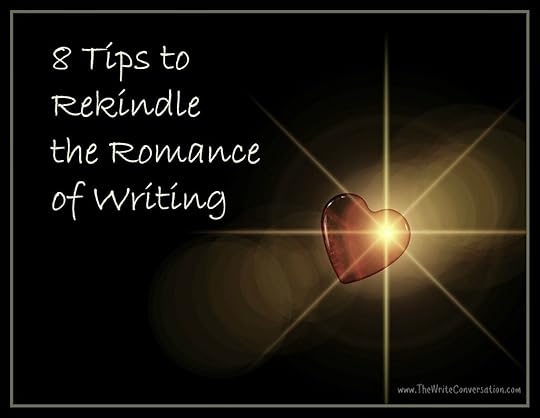 Between deadlines, edits and rejections it’s easy to fall out of love with our writing. It can get so bad that we begin to dread sitting down at the keyboard.
Between deadlines, edits and rejections it’s easy to fall out of love with our writing. It can get so bad that we begin to dread sitting down at the keyboard.
When that happens to me my mind begins to reprioritize my life. I can suddenly find a million things more important than putting my rear end in the chair and pounding out words.
When I begin arguing with myself, stating that clean baseboards are more important than word count goals, I know I’m in trouble.
Today, in honor of the upcoming holiday of love, I want to share some tips that help me fall back in love with writing.8 Tips to Rekindle the Romance of Writing1. Realize that love is a choice—not an emotion. I know that sounds more like marriage counseling than advice for writers, but truth is truth. I’ve made a commitment to what it means to be a writer, and the means not quitting when times get bad.
2. Stop the negative talk. The more you bad-mouth writing—even if it’s just in your mind—the more you’ll begin to believe what you’re hearing. This is an important step in returning to that bloom of first love. Don’t taper off the negativity, just stop . . . immediately!
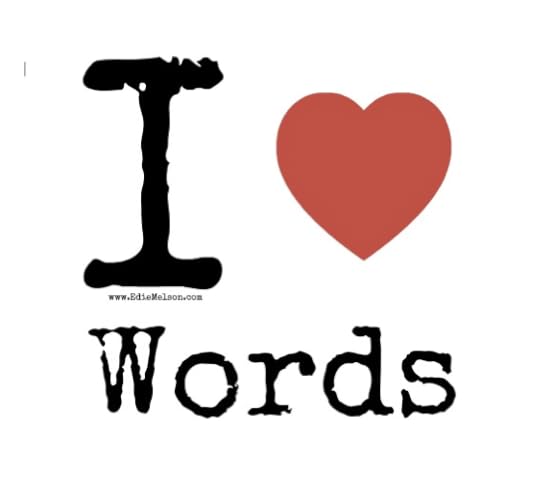 3. Make a list of all the things that made you fall in love in the first place. There was a reason you answered the siren call of words. It’s up to you to remember it and then—write it down.
3. Make a list of all the things that made you fall in love in the first place. There was a reason you answered the siren call of words. It’s up to you to remember it and then—write it down.
4. Set the mood. Just like a marriage is better with an occasional candle-lit dinner, writers also need a little romancing. Choose someplace you love and write there. It could be a coffee shop, or a cozy chair by the fireplace at home. Then add a little mood music. Even if you don’t usually write to music, sometimes the change can be just the spark to rekindle the love.
5. Make Writing a priority again. When we take something for granted, we tend to push it further down on our priority list. It's time to remember why you started writing and re-establish it as a major priority.
6. Dress it up—your writing space that is. This may mean sprucing up your office, investing in a new writing program (Scrivener anyone?) or it might just be a new bit of wall art. It doesn’t have to be expensive, just make sure it’s writing related.
7. Add a little mystery. Start your writing time with a writing prompt. If you’ve never used one before, you’re in for a treat. It’s something that gets your creativity flowing. You can type writing prompts into a search engine on the Internet and get thousands of them.
 8. Rekindle the romance. Revisit the things you love to write. If you’re working on book revisions, take time to write a poem, or short story, or devotion. Or maybe just spend some time with old-fashioned pen and paper, journaling.
8. Rekindle the romance. Revisit the things you love to write. If you’re working on book revisions, take time to write a poem, or short story, or devotion. Or maybe just spend some time with old-fashioned pen and paper, journaling.
These are the things I do when I need to fall back in love with the written word. What tips do you have. Be sure to share them in the comments section below.
Don’t forget to join the conversation!Blessings,
Edie
TWEETABLES
Not in the mood to Write? 8 Tips to Rekindle the Romance of Writing - via @EdieMelson (Click to Tweet)
Struggling to remember why you became a writer? 8 Tips to rekindle the romance - @EdieMelson (Click to Tweet)
 Between deadlines, edits and rejections it’s easy to fall out of love with our writing. It can get so bad that we begin to dread sitting down at the keyboard.
Between deadlines, edits and rejections it’s easy to fall out of love with our writing. It can get so bad that we begin to dread sitting down at the keyboard.When that happens to me my mind begins to reprioritize my life. I can suddenly find a million things more important than putting my rear end in the chair and pounding out words.
When I begin arguing with myself, stating that clean baseboards are more important than word count goals, I know I’m in trouble.
Today, in honor of the upcoming holiday of love, I want to share some tips that help me fall back in love with writing.8 Tips to Rekindle the Romance of Writing1. Realize that love is a choice—not an emotion. I know that sounds more like marriage counseling than advice for writers, but truth is truth. I’ve made a commitment to what it means to be a writer, and the means not quitting when times get bad.
2. Stop the negative talk. The more you bad-mouth writing—even if it’s just in your mind—the more you’ll begin to believe what you’re hearing. This is an important step in returning to that bloom of first love. Don’t taper off the negativity, just stop . . . immediately!
 3. Make a list of all the things that made you fall in love in the first place. There was a reason you answered the siren call of words. It’s up to you to remember it and then—write it down.
3. Make a list of all the things that made you fall in love in the first place. There was a reason you answered the siren call of words. It’s up to you to remember it and then—write it down.4. Set the mood. Just like a marriage is better with an occasional candle-lit dinner, writers also need a little romancing. Choose someplace you love and write there. It could be a coffee shop, or a cozy chair by the fireplace at home. Then add a little mood music. Even if you don’t usually write to music, sometimes the change can be just the spark to rekindle the love.
5. Make Writing a priority again. When we take something for granted, we tend to push it further down on our priority list. It's time to remember why you started writing and re-establish it as a major priority.
6. Dress it up—your writing space that is. This may mean sprucing up your office, investing in a new writing program (Scrivener anyone?) or it might just be a new bit of wall art. It doesn’t have to be expensive, just make sure it’s writing related.
7. Add a little mystery. Start your writing time with a writing prompt. If you’ve never used one before, you’re in for a treat. It’s something that gets your creativity flowing. You can type writing prompts into a search engine on the Internet and get thousands of them.
 8. Rekindle the romance. Revisit the things you love to write. If you’re working on book revisions, take time to write a poem, or short story, or devotion. Or maybe just spend some time with old-fashioned pen and paper, journaling.
8. Rekindle the romance. Revisit the things you love to write. If you’re working on book revisions, take time to write a poem, or short story, or devotion. Or maybe just spend some time with old-fashioned pen and paper, journaling.These are the things I do when I need to fall back in love with the written word. What tips do you have. Be sure to share them in the comments section below.
Don’t forget to join the conversation!Blessings,
Edie
TWEETABLES
Not in the mood to Write? 8 Tips to Rekindle the Romance of Writing - via @EdieMelson (Click to Tweet)
Struggling to remember why you became a writer? 8 Tips to rekindle the romance - @EdieMelson (Click to Tweet)
Published on February 11, 2015 01:00
February 10, 2015
So You Were Asked to be a Beta Reader
by Cindy Sproles @CindyDevoted
 The email asked, "Would you be a beta reader?" Before there was ample time to think it through, you shot an email back with an emphatic, "Yes."
The email asked, "Would you be a beta reader?" Before there was ample time to think it through, you shot an email back with an emphatic, "Yes."
A few days later, a pdf or paper book arrive along with Beta Reader Instructions.
Becoming a beta reader comes with it's perks - an early look at a new book, perhaps a signed copy , or even a personal thank you note from the author. All which are fun, but . . . there's a great responsibility that comes with serving in this position.
Betas serve as those additional eyes on a manuscript that catch typos, holes in a plot, or confusing sections that need to be corrected. It is an honor to be asked to serve as a beta reader. The author or publisher values your ability and opinion enough to allow you to have a hands-on opportunity into the editing process.
Serving as a Beta Reader is wonderful practice for a writer. It sharpens their editing skills, forces them to look closely at the work rather than just skim through. Hands down, serving as a Beta improves writing skills.
 The job of Beta readers is to:Look for typos.Catch unclear plot issues.Note odd or incorrect phrasing that makes a paragraph read rough.Read the manuscript promptly and return edits within the designated time frame set by the publisher.
The job of Beta readers is to:Look for typos.Catch unclear plot issues.Note odd or incorrect phrasing that makes a paragraph read rough.Read the manuscript promptly and return edits within the designated time frame set by the publisher.
Beta readers do not:Rewrite sentences or paragraphs.Critique the author.Share the manuscripts entrusted to them.Fail to return edits.
Every publisher has a specific format for Beta Readers to follow when making corrections. The usual format will look something like this:
Page 5, Paragraph 4, Line 6As is: Jon sent daises Mary for her birthday.Change to: Jon sent daisies to Mary for her birthday.
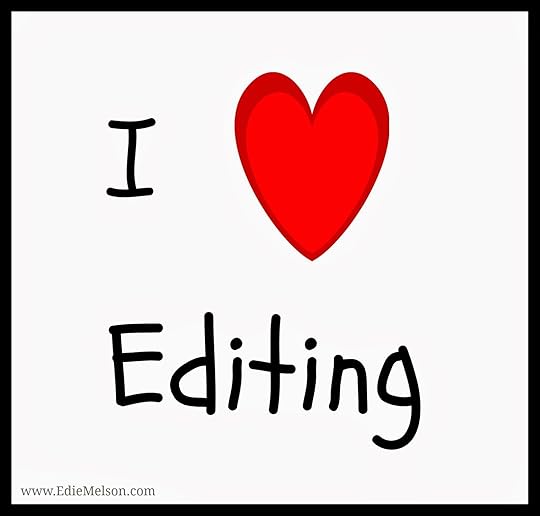 It's easy to get caught up in the thrill of editing, but it's important to understand as a Beta Reader your job is to catch errors, not critique the author or rewrite their sentences. The manuscript has been contracted and, is either in the editing process between author and editor, or already completed the process. This is not your key to adding your subjective edits. Your job is to make those changes that the editor and author no longer see because they've read the manuscript over and over. Beta eyes, are fresh eyes, unscathed with numerous rewrites. Your job is valuable in making a book, as a finished product, look the best it can be.
It's easy to get caught up in the thrill of editing, but it's important to understand as a Beta Reader your job is to catch errors, not critique the author or rewrite their sentences. The manuscript has been contracted and, is either in the editing process between author and editor, or already completed the process. This is not your key to adding your subjective edits. Your job is to make those changes that the editor and author no longer see because they've read the manuscript over and over. Beta eyes, are fresh eyes, unscathed with numerous rewrites. Your job is valuable in making a book, as a finished product, look the best it can be.
For example: Jane's book was a serious non-fiction book. Between edits with her editor, a typo slipped in.
The sentence should have read: "It's not your decision to make."
The Beta Reader caught this mistake: "It snot your decision to make."
This may make you snicker, but it's a true edit that saved the author and editor a lot of embarrassment. This is why fresh eyes are so important on a manuscript. If you're asked to be a Beta Reader, take the job seriously and edit as you are instructed. Your work will be greatly appreciated.
No book is perfect. In fact, there is rarely a book we read where we don't find a typo or misspelled word, but in the respected position of Beta Reader, you can help make these little things few and far between.
Have you had experience as or with a beta reader? Please share your insights in the comments section below.
Don't forget to join the conversation!
Cindy
TWEETABLES
Beta Readers are critical components to a book's success - author @CindyDevoted on @EdieMelson (Click to Tweet)
Do you know the responsibilities of a a Beta Reader? author @CindyDevoted breaks it down (Click to Tweet)
 Cindy Sproles is an author and popular speaker. She is the cofounder of Christian Devotions ministries and managing editor of Straight Street Books and SonRise Devotionals, imprints of Lighthouse Publishing of the Carolinas. Cindy is the executive editor of www.christiandevotions.us and www.inspireafire.com. She teaches at writers conferences nationwide and directs The Asheville Christian Writers Conference - Writers Boot Camp.
Cindy Sproles is an author and popular speaker. She is the cofounder of Christian Devotions ministries and managing editor of Straight Street Books and SonRise Devotionals, imprints of Lighthouse Publishing of the Carolinas. Cindy is the executive editor of www.christiandevotions.us and www.inspireafire.com. She teaches at writers conferences nationwide and directs The Asheville Christian Writers Conference - Writers Boot Camp.
She is the author of two devotionals, He Said, She Said - Learning to Live aLife of Passion and New Sheets - Thirty Days to Refine You into theWoman You Can Be. Cindy's debut fiction novel, Mercy's Rain, is available at major retailers. Visit Cindy at www.cindysproles.com and book her for your next conference or ladies retreat. Also connect with her on Facebook and Twitter.
 The email asked, "Would you be a beta reader?" Before there was ample time to think it through, you shot an email back with an emphatic, "Yes."
The email asked, "Would you be a beta reader?" Before there was ample time to think it through, you shot an email back with an emphatic, "Yes."A few days later, a pdf or paper book arrive along with Beta Reader Instructions.
Becoming a beta reader comes with it's perks - an early look at a new book, perhaps a signed copy , or even a personal thank you note from the author. All which are fun, but . . . there's a great responsibility that comes with serving in this position.
Betas serve as those additional eyes on a manuscript that catch typos, holes in a plot, or confusing sections that need to be corrected. It is an honor to be asked to serve as a beta reader. The author or publisher values your ability and opinion enough to allow you to have a hands-on opportunity into the editing process.
Serving as a Beta Reader is wonderful practice for a writer. It sharpens their editing skills, forces them to look closely at the work rather than just skim through. Hands down, serving as a Beta improves writing skills.
 The job of Beta readers is to:Look for typos.Catch unclear plot issues.Note odd or incorrect phrasing that makes a paragraph read rough.Read the manuscript promptly and return edits within the designated time frame set by the publisher.
The job of Beta readers is to:Look for typos.Catch unclear plot issues.Note odd or incorrect phrasing that makes a paragraph read rough.Read the manuscript promptly and return edits within the designated time frame set by the publisher.Beta readers do not:Rewrite sentences or paragraphs.Critique the author.Share the manuscripts entrusted to them.Fail to return edits.
Every publisher has a specific format for Beta Readers to follow when making corrections. The usual format will look something like this:
Page 5, Paragraph 4, Line 6As is: Jon sent daises Mary for her birthday.Change to: Jon sent daisies to Mary for her birthday.
 It's easy to get caught up in the thrill of editing, but it's important to understand as a Beta Reader your job is to catch errors, not critique the author or rewrite their sentences. The manuscript has been contracted and, is either in the editing process between author and editor, or already completed the process. This is not your key to adding your subjective edits. Your job is to make those changes that the editor and author no longer see because they've read the manuscript over and over. Beta eyes, are fresh eyes, unscathed with numerous rewrites. Your job is valuable in making a book, as a finished product, look the best it can be.
It's easy to get caught up in the thrill of editing, but it's important to understand as a Beta Reader your job is to catch errors, not critique the author or rewrite their sentences. The manuscript has been contracted and, is either in the editing process between author and editor, or already completed the process. This is not your key to adding your subjective edits. Your job is to make those changes that the editor and author no longer see because they've read the manuscript over and over. Beta eyes, are fresh eyes, unscathed with numerous rewrites. Your job is valuable in making a book, as a finished product, look the best it can be.For example: Jane's book was a serious non-fiction book. Between edits with her editor, a typo slipped in.
The sentence should have read: "It's not your decision to make."
The Beta Reader caught this mistake: "It snot your decision to make."
This may make you snicker, but it's a true edit that saved the author and editor a lot of embarrassment. This is why fresh eyes are so important on a manuscript. If you're asked to be a Beta Reader, take the job seriously and edit as you are instructed. Your work will be greatly appreciated.
No book is perfect. In fact, there is rarely a book we read where we don't find a typo or misspelled word, but in the respected position of Beta Reader, you can help make these little things few and far between.
Have you had experience as or with a beta reader? Please share your insights in the comments section below.
Don't forget to join the conversation!
Cindy
TWEETABLES
Beta Readers are critical components to a book's success - author @CindyDevoted on @EdieMelson (Click to Tweet)
Do you know the responsibilities of a a Beta Reader? author @CindyDevoted breaks it down (Click to Tweet)
 Cindy Sproles is an author and popular speaker. She is the cofounder of Christian Devotions ministries and managing editor of Straight Street Books and SonRise Devotionals, imprints of Lighthouse Publishing of the Carolinas. Cindy is the executive editor of www.christiandevotions.us and www.inspireafire.com. She teaches at writers conferences nationwide and directs The Asheville Christian Writers Conference - Writers Boot Camp.
Cindy Sproles is an author and popular speaker. She is the cofounder of Christian Devotions ministries and managing editor of Straight Street Books and SonRise Devotionals, imprints of Lighthouse Publishing of the Carolinas. Cindy is the executive editor of www.christiandevotions.us and www.inspireafire.com. She teaches at writers conferences nationwide and directs The Asheville Christian Writers Conference - Writers Boot Camp.
She is the author of two devotionals, He Said, She Said - Learning to Live aLife of Passion and New Sheets - Thirty Days to Refine You into theWoman You Can Be. Cindy's debut fiction novel, Mercy's Rain, is available at major retailers. Visit Cindy at www.cindysproles.com and book her for your next conference or ladies retreat. Also connect with her on Facebook and Twitter.
Published on February 10, 2015 01:00
February 9, 2015
Five Ways To Tell If You're a Fiction Writer
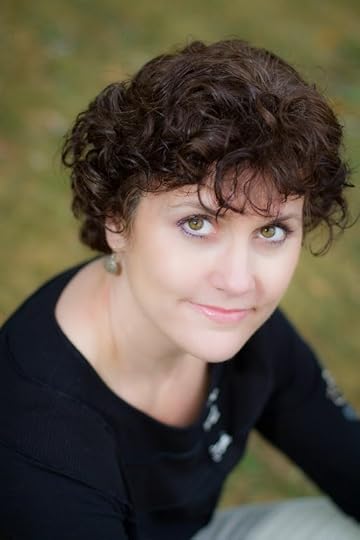 Edie here. Today I'm super excited to introduce you to one of the 2015 Blogging Excellence Award, Michelle Griep. Not only does she have a fabulous blog, Writer off the Leash, she's also a regular contributor of Novel Rocket. She's a fiction writer extraordinaire and she has a super new book for writers out, WRITER OFF THE LEASH: GROWING IN THE WRITING CRAFT. So with no further delay...
Edie here. Today I'm super excited to introduce you to one of the 2015 Blogging Excellence Award, Michelle Griep. Not only does she have a fabulous blog, Writer off the Leash, she's also a regular contributor of Novel Rocket. She's a fiction writer extraordinaire and she has a super new book for writers out, WRITER OFF THE LEASH: GROWING IN THE WRITING CRAFT. So with no further delay...Five Ways to Tell if You Are a Fiction Writer
by Michelle Griep @MichelleGriep
Writers are strange animals. They’re solitary mammals, prone to long stretches of hibernation unrelated to weather conditions. Generally, they’re pale, wear glasses, and for some reason I’ve never been able to figure out, tend to wear flamboyant hats. What’s up with that?
If you suspect there’s a writer gene in your DNA, here’s a surefire test that doesn’t require a blood draw or even a swab of the inside of your mouth.
 Copyright: /
Copyright: / 123RF Stock PhotoAuthors invent people. You craft words to connect readers to your characters, pulling at their heartstrings, making them best buddies. Then all for the sake of story, you take those imaginary friends and ramp up the catastrophes. Bam. Bam. Bam. All leading to a horrific climax.
“Meet Susan. She’s blonde, friendly, the girl next door with good dental hygiene. Her freckles are endearing and she helps little old ladies across the street. Everyone loves Susan. Whoopsidoodle! A Mack truck just hit Susan. Her dog died. And now there’s a one-armed stalker with an eye patch who wants to drink her blood. Poor, poor Susan.”
2. Your skill at lying is exceeded only by those in Washington.
Writers get paid to tell whoppers, kind of like attorneys, only without the debt of law school. It’s an author’s job to convince others of the plausibility of their story, to pull the reader into a whole new world—one they can taste, touch, and smell. Remember Susan? Yeah. Enough said.
3. You’re an über-frustrated control freak.
You sit around all day, controlling what your characters say and wear, manipulating how they act and feel. You are god of your fictional realm. Nothing happens unless you make it so. Enjoy the feeling, minion, because when you surface from storyland, you don’t get to control reviews, contracts, publisher advances, or book placement, and you’re at the complete mercy of the Amazon recommendation algorithm.
 Copyright: /
Copyright: / 123RF Stock Photo4. You long for a raging bout of tinnitus just to shut up the voices in your head for a while.
When you’re asked about where you get your story ideas, you respond with, “I just listen to the voices in my head.” At least that’s how you answer the first time. After you’ve been scarred by the horrified face-twisting that answer produces, you learn to reply, “Oh, here and there.” But that does nothing to clamp the lips of the story Sirens tempting you to listen to the best plot idea in the history of mankind. And don’t bother buying the sound-cancelling earbuds. They don’t work.
5. You fly your freak flag high.
Hey, if being nutty-nuts was good enough for Tolstoy, Hemmingway, and Poe, you’re all for it. Besides which, you know you’re not batty, bonkers, or berserk. You’re eccentric.
Any one of these symptoms gonging a bell in your head and heart? If so, guess what. Yep. You’re a writer, Hoss, and/or possibly psychotic. Don’t worry, though. In this day of political correctness, no one will dare label you a nut job for fear of a lawsuit.
TWEETABLESUncertain if you're cut out to write fiction? @MichelleGriep has the checklist to tell on @EdieMelson (Click to Tweet)
Secrets from @MichelleGriep - 5 Ways to Tell if You're a Fiction Writer on @EdieMelson (Click to Tweet)
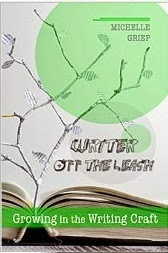 Like what you read? There’s more.
WRITEROFF THE LEASH: GROWING IN THE WRITING CRAFT
is a kick in the pants for anyone who wants to write but is stymied by fear, doubt, or simply doesn’t know how to take their writing to the next level.
Like what you read? There’s more.
WRITEROFF THE LEASH: GROWING IN THE WRITING CRAFT
is a kick in the pants for anyone who wants to write but is stymied by fear, doubt, or simply doesn’t know how to take their writing to the next level.Michelle Griep’s been writing since she first discovered blank wall space and Crayolas. Follow her adventures and find out about upcoming new releases at her blog, Writer Off the Leash , or stop by her website . You can also find her at the usual haunts of Facebook , Twitter , or Pinterest .
Published on February 09, 2015 01:00
February 8, 2015
The Dance
by Sarah Van Diest
 “I cry aloud with my voice to the Lord; I make supplication with my voice to the Lord. I pour out my complaint before Him; I declare my trouble before Him. When my spirit was overwhelmed within me, You knew my path.” Psalm 142:1-3a
“I cry aloud with my voice to the Lord; I make supplication with my voice to the Lord. I pour out my complaint before Him; I declare my trouble before Him. When my spirit was overwhelmed within me, You knew my path.” Psalm 142:1-3a
“Let them praise his name with dancing” Psalm 149:3a
Greetings, friend.
I hope you are doing well; that your heart is secure in the love of our Father each step today; that rest comes easily and food is satisfying. The simple things of life seem to be the basis from which all other joys emerge, so I hope those simple things are in place for you today.
But I counter my own conclusion with the understanding that life’s trials bring a deeper joy than simple pleasures are capable of producing. The body may be failing and yet its associated pains are not sufficient to drown out the joy of knowing that the Father sits with us when we are unable to walk.
I am complaining today. I am tired and my hand hurts from the cancer removed yesterday; the stitches pull and my skin is tight. New medication to slow my heart beat makes me feel fatigued and weary, and a night of little sleep from the anesthesia fading from my hand heaps on that. I am complaining.
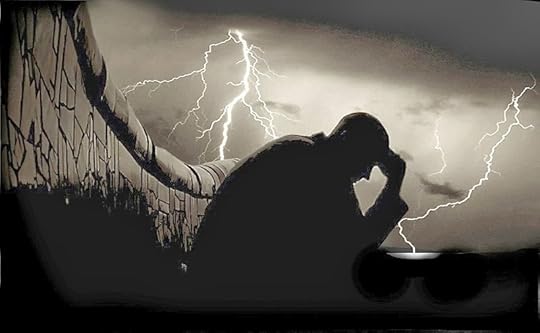 So I take my complaints and lay them out there, lifeless as they are, and look at them. They aren’t so bad. They don’t really do anything. They just lie there. Like all the other feelings I’ve put out there to observe, they just sit there. I know them but they aren’t me. And that is a more important distinction to make than any I can think of right now. I know them, but they are not me.
So I take my complaints and lay them out there, lifeless as they are, and look at them. They aren’t so bad. They don’t really do anything. They just lie there. Like all the other feelings I’ve put out there to observe, they just sit there. I know them but they aren’t me. And that is a more important distinction to make than any I can think of right now. I know them, but they are not me.
I am not defined by them, but rather they are something that is part of my experience; as if they were a place I visit along the way but leave behind as I keep walking. They add to my compassion when I see others pained in similar ways. They remind me of my frailty and put to rest (again) my faulty beliefs of my invulnerability and self-sufficiency. They speak to me of my bond with this earth, and all life and death that circles and cycles through here. These are good and needed messages for my soul, if I choose to take them as such.
My complaining reminds me of what expectations reside in me; expectations of health and satisfaction, as if those are what this life is about and those are goals for which I strive. Really? At the end of my life am I going to hope that above all things I lived a life of health and satisfaction? How tragic that would be!
May that not be my epitaph.
 Rather faith, hope, and most highly, love. Those words. Those truths. Those sentiments and aspirations. To live a life defined in such terms would be a glorious thing! To walk in this life of pains and afflictions with faith, hope and love is a beautiful, graceful way to step along the road. The walk then becomes a dance. The burdens stemming from being bound to this world become teachers of new dance steps as the Father plays the music: the pebble on the path – a skip; the chilling wind – a twirl; and the heavy weight – a bow. A dance.
Rather faith, hope, and most highly, love. Those words. Those truths. Those sentiments and aspirations. To live a life defined in such terms would be a glorious thing! To walk in this life of pains and afflictions with faith, hope and love is a beautiful, graceful way to step along the road. The walk then becomes a dance. The burdens stemming from being bound to this world become teachers of new dance steps as the Father plays the music: the pebble on the path – a skip; the chilling wind – a twirl; and the heavy weight – a bow. A dance.
I am still tired and my hand still aches, but my heart is lighter now. I am thankful for my teachers and even more thankful for the music my Father plays in my heart. Those feelings that I know but aren’t me are still there just as they were, but faith, hope and love enliven the movements of my soul. This is simple. This is practicing the presence of the Father. This is remembering and seeing life in the midst of the gradual and daily dying. This is the dance.
Grace and Peace,Sarah
 Sarah has worked in Christian publishing since 2005 as both and editor and an agent.
Sarah has worked in Christian publishing since 2005 as both and editor and an agent.
Currently, she works with her husband, David, in their agency, the Van Diest Literary Agency. Writing is a growing passion for her as she hopes to bring hope to hurting hearts.
 “I cry aloud with my voice to the Lord; I make supplication with my voice to the Lord. I pour out my complaint before Him; I declare my trouble before Him. When my spirit was overwhelmed within me, You knew my path.” Psalm 142:1-3a
“I cry aloud with my voice to the Lord; I make supplication with my voice to the Lord. I pour out my complaint before Him; I declare my trouble before Him. When my spirit was overwhelmed within me, You knew my path.” Psalm 142:1-3a“Let them praise his name with dancing” Psalm 149:3a
Greetings, friend.
I hope you are doing well; that your heart is secure in the love of our Father each step today; that rest comes easily and food is satisfying. The simple things of life seem to be the basis from which all other joys emerge, so I hope those simple things are in place for you today.
But I counter my own conclusion with the understanding that life’s trials bring a deeper joy than simple pleasures are capable of producing. The body may be failing and yet its associated pains are not sufficient to drown out the joy of knowing that the Father sits with us when we are unable to walk.
I am complaining today. I am tired and my hand hurts from the cancer removed yesterday; the stitches pull and my skin is tight. New medication to slow my heart beat makes me feel fatigued and weary, and a night of little sleep from the anesthesia fading from my hand heaps on that. I am complaining.
 So I take my complaints and lay them out there, lifeless as they are, and look at them. They aren’t so bad. They don’t really do anything. They just lie there. Like all the other feelings I’ve put out there to observe, they just sit there. I know them but they aren’t me. And that is a more important distinction to make than any I can think of right now. I know them, but they are not me.
So I take my complaints and lay them out there, lifeless as they are, and look at them. They aren’t so bad. They don’t really do anything. They just lie there. Like all the other feelings I’ve put out there to observe, they just sit there. I know them but they aren’t me. And that is a more important distinction to make than any I can think of right now. I know them, but they are not me. I am not defined by them, but rather they are something that is part of my experience; as if they were a place I visit along the way but leave behind as I keep walking. They add to my compassion when I see others pained in similar ways. They remind me of my frailty and put to rest (again) my faulty beliefs of my invulnerability and self-sufficiency. They speak to me of my bond with this earth, and all life and death that circles and cycles through here. These are good and needed messages for my soul, if I choose to take them as such.
My complaining reminds me of what expectations reside in me; expectations of health and satisfaction, as if those are what this life is about and those are goals for which I strive. Really? At the end of my life am I going to hope that above all things I lived a life of health and satisfaction? How tragic that would be!
May that not be my epitaph.
 Rather faith, hope, and most highly, love. Those words. Those truths. Those sentiments and aspirations. To live a life defined in such terms would be a glorious thing! To walk in this life of pains and afflictions with faith, hope and love is a beautiful, graceful way to step along the road. The walk then becomes a dance. The burdens stemming from being bound to this world become teachers of new dance steps as the Father plays the music: the pebble on the path – a skip; the chilling wind – a twirl; and the heavy weight – a bow. A dance.
Rather faith, hope, and most highly, love. Those words. Those truths. Those sentiments and aspirations. To live a life defined in such terms would be a glorious thing! To walk in this life of pains and afflictions with faith, hope and love is a beautiful, graceful way to step along the road. The walk then becomes a dance. The burdens stemming from being bound to this world become teachers of new dance steps as the Father plays the music: the pebble on the path – a skip; the chilling wind – a twirl; and the heavy weight – a bow. A dance.I am still tired and my hand still aches, but my heart is lighter now. I am thankful for my teachers and even more thankful for the music my Father plays in my heart. Those feelings that I know but aren’t me are still there just as they were, but faith, hope and love enliven the movements of my soul. This is simple. This is practicing the presence of the Father. This is remembering and seeing life in the midst of the gradual and daily dying. This is the dance.
Grace and Peace,Sarah
 Sarah has worked in Christian publishing since 2005 as both and editor and an agent.
Sarah has worked in Christian publishing since 2005 as both and editor and an agent. Currently, she works with her husband, David, in their agency, the Van Diest Literary Agency. Writing is a growing passion for her as she hopes to bring hope to hurting hearts.
Published on February 08, 2015 01:00
February 7, 2015
Beauty in Words—A Social Media Image to Share
I'm a huge Edgar Allan Poe fan, and this weekend we had the opportunity to hang out at Poe's Tavern, in Charleston, SC. So in honor of this amazing place, I'm sharing a quote from Poe.
I'd love to know what your favorite Poe quote is.
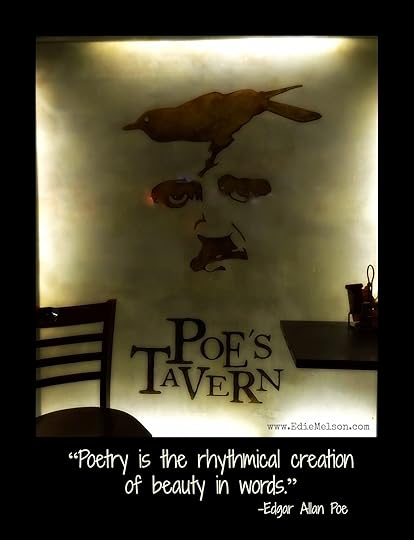 "Poetry is the rhythmical creation of beauty in words." - Edgar Allen Poe
"Poetry is the rhythmical creation of beauty in words." - Edgar Allen Poe
Share your thoughts in the comment section below.
I also invite you to use this image any way you like online. Post it to your blog, share it on Facebook, Twitter, Pinterest, anywhere you'd like. All I ask is that you keep it intact, with my website watermark visible.
Don't forget to join the conversation!Blessings,
Edie
I'd love to know what your favorite Poe quote is.
 "Poetry is the rhythmical creation of beauty in words." - Edgar Allen Poe
"Poetry is the rhythmical creation of beauty in words." - Edgar Allen PoeShare your thoughts in the comment section below.
I also invite you to use this image any way you like online. Post it to your blog, share it on Facebook, Twitter, Pinterest, anywhere you'd like. All I ask is that you keep it intact, with my website watermark visible.
Don't forget to join the conversation!Blessings,
Edie
Published on February 07, 2015 01:00
February 6, 2015
A Musing Writer
by Bruce Brady @BDBrady007
 I love art.
I love art.
I especially love musing art until I have a story to go with it. All forms of art, whether created by camera, computer, musical instrument, or hand, set my mind in motion. They grab my eyes or ears—then my mind.
You see, every piece of artwork has a compelling story. At least for me. And the moment it captures my attention, I begin to imagine the motivation behind it. I don’t know of any works of art that aren’t the result of the artists’ emotions or experiences. And the detective in me asks, “What happened?” or “What were they thinking?”
I don’t know of any works of art that aren’t the result of the artists’ emotions or experiences. And the detective in me asks, “What happened?” or “What were they thinking?”
Many of my stories—fiction and non-fiction—resulted from staring at a photograph, painting, or other form of physical art until I imagined the story behind it. Others came from listening to music long enough for my mind to produce a movie to go with it.
I recently won a flash-fiction contest by writing the story I saw in the painting prompt that was used.
 If you’ve not used art as a muse, why not give it a try? Simply focus your attention on a work of art until you “see” a story. Don’t rush it, especially if you’ve not done this before. Allow your thoughts to flow freely until they present a story that excites you. This may take some time—perhaps days or weeks. Be patient. Write down whatever comes to mind. No matter how silly or shocking.
If you’ve not used art as a muse, why not give it a try? Simply focus your attention on a work of art until you “see” a story. Don’t rush it, especially if you’ve not done this before. Allow your thoughts to flow freely until they present a story that excites you. This may take some time—perhaps days or weeks. Be patient. Write down whatever comes to mind. No matter how silly or shocking.
Don’t outline. Just write whatever your mind sees. Record every impression you have until you’ve exhausted the possibilities. Then pick the scenario that suits you and run with it, using the method that works best for you.
My stories come to me as “movies” in my head. I simply write what I see. I’m aware that others see words instead of pictures. No matter how you “see” your stories, I encourage you to try adding art as a prompt to expand your writing possibilities or help break “writer’s block.”
A word of caution. I love visual art so much that I sometimes catch myself spending too much time saving it to my “Writing Prompt” file—time I should be using to write. If you find yourself doing the same thing, contact me. We’ll start an “Arts Anonymous” group so we can be more productive.
As writers, we are always learning. I like to know what motivates your stories? Please tell me in the comments section below. Let’s keep the conversation going.
TWEETABLESWhat inspires you as a writer? Thoughts from @BDBrady007 on @EdieMelson (Click to Tweet)
Thoughts from A Musing Writer, Bruce Brady, @BDBrady007 on @EdieMelson (Click to Tweet)
 Bruce Brady is an author, writer and playwright. His work has appeared in Focus on the Family’s Thriving Family, www.ChristianDevotions.us, and on stage. Currently, Bruce is working on a Young Adult Novel about a boy who must deal with the death of his dad, being bullied, and helping his mom through her grief. His first five pages took third place in the ACFW South Carolina Chapter’s “First Five Pages” contest.
Bruce Brady is an author, writer and playwright. His work has appeared in Focus on the Family’s Thriving Family, www.ChristianDevotions.us, and on stage. Currently, Bruce is working on a Young Adult Novel about a boy who must deal with the death of his dad, being bullied, and helping his mom through her grief. His first five pages took third place in the ACFW South Carolina Chapter’s “First Five Pages” contest.
When he’s not writing, Bruce spends time learning from and helping other writers. He serves as Mentor of Word Weavers International’s Online Chapter, and as a member of Cross ‘N’ Pens, The Writer’s Plot, ACFW’s National and South Carolina Chapters.
“My dream is to entertain my readers and give them hope as they travel the rocky road of life.”
 I love art.
I love art.I especially love musing art until I have a story to go with it. All forms of art, whether created by camera, computer, musical instrument, or hand, set my mind in motion. They grab my eyes or ears—then my mind.
You see, every piece of artwork has a compelling story. At least for me. And the moment it captures my attention, I begin to imagine the motivation behind it.
 I don’t know of any works of art that aren’t the result of the artists’ emotions or experiences. And the detective in me asks, “What happened?” or “What were they thinking?”
I don’t know of any works of art that aren’t the result of the artists’ emotions or experiences. And the detective in me asks, “What happened?” or “What were they thinking?”Many of my stories—fiction and non-fiction—resulted from staring at a photograph, painting, or other form of physical art until I imagined the story behind it. Others came from listening to music long enough for my mind to produce a movie to go with it.
I recently won a flash-fiction contest by writing the story I saw in the painting prompt that was used.
 If you’ve not used art as a muse, why not give it a try? Simply focus your attention on a work of art until you “see” a story. Don’t rush it, especially if you’ve not done this before. Allow your thoughts to flow freely until they present a story that excites you. This may take some time—perhaps days or weeks. Be patient. Write down whatever comes to mind. No matter how silly or shocking.
If you’ve not used art as a muse, why not give it a try? Simply focus your attention on a work of art until you “see” a story. Don’t rush it, especially if you’ve not done this before. Allow your thoughts to flow freely until they present a story that excites you. This may take some time—perhaps days or weeks. Be patient. Write down whatever comes to mind. No matter how silly or shocking.Don’t outline. Just write whatever your mind sees. Record every impression you have until you’ve exhausted the possibilities. Then pick the scenario that suits you and run with it, using the method that works best for you.
My stories come to me as “movies” in my head. I simply write what I see. I’m aware that others see words instead of pictures. No matter how you “see” your stories, I encourage you to try adding art as a prompt to expand your writing possibilities or help break “writer’s block.”
A word of caution. I love visual art so much that I sometimes catch myself spending too much time saving it to my “Writing Prompt” file—time I should be using to write. If you find yourself doing the same thing, contact me. We’ll start an “Arts Anonymous” group so we can be more productive.
As writers, we are always learning. I like to know what motivates your stories? Please tell me in the comments section below. Let’s keep the conversation going.
TWEETABLESWhat inspires you as a writer? Thoughts from @BDBrady007 on @EdieMelson (Click to Tweet)
Thoughts from A Musing Writer, Bruce Brady, @BDBrady007 on @EdieMelson (Click to Tweet)
 Bruce Brady is an author, writer and playwright. His work has appeared in Focus on the Family’s Thriving Family, www.ChristianDevotions.us, and on stage. Currently, Bruce is working on a Young Adult Novel about a boy who must deal with the death of his dad, being bullied, and helping his mom through her grief. His first five pages took third place in the ACFW South Carolina Chapter’s “First Five Pages” contest.
Bruce Brady is an author, writer and playwright. His work has appeared in Focus on the Family’s Thriving Family, www.ChristianDevotions.us, and on stage. Currently, Bruce is working on a Young Adult Novel about a boy who must deal with the death of his dad, being bullied, and helping his mom through her grief. His first five pages took third place in the ACFW South Carolina Chapter’s “First Five Pages” contest.When he’s not writing, Bruce spends time learning from and helping other writers. He serves as Mentor of Word Weavers International’s Online Chapter, and as a member of Cross ‘N’ Pens, The Writer’s Plot, ACFW’s National and South Carolina Chapters.
“My dream is to entertain my readers and give them hope as they travel the rocky road of life.”
Published on February 06, 2015 01:00
February 5, 2015
The Value of our Editors—in Decorating & in Writing
by Lynn Blackburn @LynnHBlackburn
 People tend to assume if you’ve written a book that you are super creative in many other areas. The reality is while you may be creative with words, that doesn’t mean you have one ounce of skill with fabric, color, or that you have a clue how to pick out a lamp.
People tend to assume if you’ve written a book that you are super creative in many other areas. The reality is while you may be creative with words, that doesn’t mean you have one ounce of skill with fabric, color, or that you have a clue how to pick out a lamp.
I am one of those people.A few years ago, I was lucky enough to develop a friendship with a wonderful designer. Her name is Lisa. I was terrified the first time Lisa came to my house. Embarrassed, even. What if she felt like my house was beyond help? Thankfully, she likes a challenge. She gets me. She shops at TJMaxx and Marshalls and is even more careful about my budget than I am.
She’s particularly talented at taking what I already have and re-arranging it in a way that makes so much more sense than the way I had it. She then brings in a few additional pieces, and asks if I like them. I can keep them or suggest we try something a little different.
 Between the two of us, we wind up with a room that is still 100% mine, but it’s so much better than anything I could have come up with on my own. It’s my stuff, with a few new things I would have picked out if I’d had the sense to know how awesome they were, all pulled together into a cohesive whole.
Between the two of us, we wind up with a room that is still 100% mine, but it’s so much better than anything I could have come up with on my own. It’s my stuff, with a few new things I would have picked out if I’d had the sense to know how awesome they were, all pulled together into a cohesive whole.
About a week after my final edits had been approved for my first book, Covert Justice , I called Lisa for an emergency intervention. I had tried to go it alone. I had an idea, I went shopping, I started decorating. When I was done, my downstairs looked like the epicenter of a Hobby Lobby explosion. Lisa fixed it in two hours.
As she left, and I relaxed in a room that actually looked like the vision I’d had in my head, I couldn’t help but notice the similarities to the editorial process.
 I was so afraid to send my manuscript to my editor. TERRIFIED. Embarrassed that she would read my words and deem them hopeless. As it turned out my editor, Elizabeth, likes a challenge and she gets me. When I read through my edits, rather than crying or gasping in pain, I found myself laughing and chuckling at the remarks she made in the sidebar.
I was so afraid to send my manuscript to my editor. TERRIFIED. Embarrassed that she would read my words and deem them hopeless. As it turned out my editor, Elizabeth, likes a challenge and she gets me. When I read through my edits, rather than crying or gasping in pain, I found myself laughing and chuckling at the remarks she made in the sidebar.
She made suggestions for re-arranging things, slowing down the romance, and adding in more conflict. When it was all said and done, the book we wound up with is still 100% mine, but it is so much better than anything I could have come up with on my own.
No matter how many books I write, I will always need an editor. Someone to take a look with fresh eyes, make suggestions, and help me turn my vision into reality.
So let’s talk about this. Are you afraid of editors? Want to brag on yours? Don’t forget to join the conversation!
TWEETABLESThe value of our editors—in decorating and in #writing - via @LynnHBlackburn on @EdieMelson (Click to Tweet)
There's no reason to fear editing, it can only make us better - via @LynnHBlackburn on @EdieMelson (Click to Tweet)
 Lynn Huggins Blackburn believes in the power of stories, especially those that remind us that true love exists, a gift from the Truest Love. She’s passionate about CrossFit, coffee, and chocolate (don’t make her choose) and experimenting with recipes that feed both body and soul. She lives in South Carolina with her true love, Brian, and their three children. You can follow her real life happily ever after at http://www.lynnhugginsblackburn.com.
Lynn Huggins Blackburn believes in the power of stories, especially those that remind us that true love exists, a gift from the Truest Love. She’s passionate about CrossFit, coffee, and chocolate (don’t make her choose) and experimenting with recipes that feed both body and soul. She lives in South Carolina with her true love, Brian, and their three children. You can follow her real life happily ever after at http://www.lynnhugginsblackburn.com.
 People tend to assume if you’ve written a book that you are super creative in many other areas. The reality is while you may be creative with words, that doesn’t mean you have one ounce of skill with fabric, color, or that you have a clue how to pick out a lamp.
People tend to assume if you’ve written a book that you are super creative in many other areas. The reality is while you may be creative with words, that doesn’t mean you have one ounce of skill with fabric, color, or that you have a clue how to pick out a lamp.I am one of those people.A few years ago, I was lucky enough to develop a friendship with a wonderful designer. Her name is Lisa. I was terrified the first time Lisa came to my house. Embarrassed, even. What if she felt like my house was beyond help? Thankfully, she likes a challenge. She gets me. She shops at TJMaxx and Marshalls and is even more careful about my budget than I am.
She’s particularly talented at taking what I already have and re-arranging it in a way that makes so much more sense than the way I had it. She then brings in a few additional pieces, and asks if I like them. I can keep them or suggest we try something a little different.
 Between the two of us, we wind up with a room that is still 100% mine, but it’s so much better than anything I could have come up with on my own. It’s my stuff, with a few new things I would have picked out if I’d had the sense to know how awesome they were, all pulled together into a cohesive whole.
Between the two of us, we wind up with a room that is still 100% mine, but it’s so much better than anything I could have come up with on my own. It’s my stuff, with a few new things I would have picked out if I’d had the sense to know how awesome they were, all pulled together into a cohesive whole. About a week after my final edits had been approved for my first book, Covert Justice , I called Lisa for an emergency intervention. I had tried to go it alone. I had an idea, I went shopping, I started decorating. When I was done, my downstairs looked like the epicenter of a Hobby Lobby explosion. Lisa fixed it in two hours.
As she left, and I relaxed in a room that actually looked like the vision I’d had in my head, I couldn’t help but notice the similarities to the editorial process.
 I was so afraid to send my manuscript to my editor. TERRIFIED. Embarrassed that she would read my words and deem them hopeless. As it turned out my editor, Elizabeth, likes a challenge and she gets me. When I read through my edits, rather than crying or gasping in pain, I found myself laughing and chuckling at the remarks she made in the sidebar.
I was so afraid to send my manuscript to my editor. TERRIFIED. Embarrassed that she would read my words and deem them hopeless. As it turned out my editor, Elizabeth, likes a challenge and she gets me. When I read through my edits, rather than crying or gasping in pain, I found myself laughing and chuckling at the remarks she made in the sidebar.She made suggestions for re-arranging things, slowing down the romance, and adding in more conflict. When it was all said and done, the book we wound up with is still 100% mine, but it is so much better than anything I could have come up with on my own.
No matter how many books I write, I will always need an editor. Someone to take a look with fresh eyes, make suggestions, and help me turn my vision into reality.
So let’s talk about this. Are you afraid of editors? Want to brag on yours? Don’t forget to join the conversation!
TWEETABLESThe value of our editors—in decorating and in #writing - via @LynnHBlackburn on @EdieMelson (Click to Tweet)
There's no reason to fear editing, it can only make us better - via @LynnHBlackburn on @EdieMelson (Click to Tweet)
 Lynn Huggins Blackburn believes in the power of stories, especially those that remind us that true love exists, a gift from the Truest Love. She’s passionate about CrossFit, coffee, and chocolate (don’t make her choose) and experimenting with recipes that feed both body and soul. She lives in South Carolina with her true love, Brian, and their three children. You can follow her real life happily ever after at http://www.lynnhugginsblackburn.com.
Lynn Huggins Blackburn believes in the power of stories, especially those that remind us that true love exists, a gift from the Truest Love. She’s passionate about CrossFit, coffee, and chocolate (don’t make her choose) and experimenting with recipes that feed both body and soul. She lives in South Carolina with her true love, Brian, and their three children. You can follow her real life happily ever after at http://www.lynnhugginsblackburn.com.
Published on February 05, 2015 01:00



